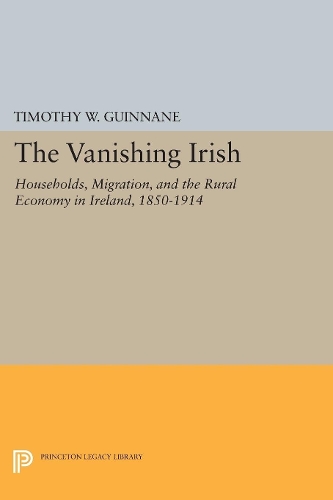
The Vanishing Irish: Households, Migration, and the Rural Economy in Ireland, 1850-1914
(Hardback)
Available Formats
Hardback
Published: 28th June 2016
Hardback
Published: 12th January 1998
Paperback
Published: 15th February 2016
Publishing Details
The Vanishing Irish: Households, Migration, and the Rural Economy in Ireland, 1850-1914
By (Author) Timothy W. Guinnane
Princeton University Press
Princeton University Press
12th January 1998
United States
Classifications
Tertiary Education
Non Fiction
European history
304.6209415
Winner of ACIS Donald Murphy Prize for Distinguished First Book 1998
Physical Properties
Hardback
360
Width 152mm, Height 235mm
652g
Description
In the years between the Great Famine of the 1840s and the First World War, Ireland experienced a drastic drop in population: the percentage of adults who never married soared from 10 percent to 25 percent, while the overall population decreased by one third. What accounted for this For many social analysts, the history of post-Famine Irish depopulation was a Malthusian morality tale where declining living standards led young people to postpone marriage out of concern for their ability to support a family. The problem here, argues Timothy Guinnane, is that living standards in post-Famine Ireland did not decline. Rather, other, more subtle economic changes influenced the decision to delay marriage or not marry at all. In this engaging inquiry into the "vanishing Irish," Guinnane explores the options that presented themselves to Ireland's younger generations, taking into account household structure, inheritance, religion, cultural influences on marriage and family life, and especially emigration.Guinnane focuses on rural Ireland, where the population changes were most profound, and explores the way the demographic patterns reflect the rural Irish economy, Ireland's place as a small part in a much larger English-speaking world, and the influence of earlier Irish history and culture. Particular effort is made to compare Irish demographic behavior to similar patterns elsewhere in Europe, revealing an Ireland anchored in European tradition and yet a distinctive society in its own right.
Reviews
Winner of the 1998 Donald Murphy Prize for Best First Book in Irish Studies, American Conference for Irish Studies One of Choice's Outstanding Academic Titles for 1998
Author Bio
Timothy W. Guinnane is Associate Professor of Economics at Yale University.
